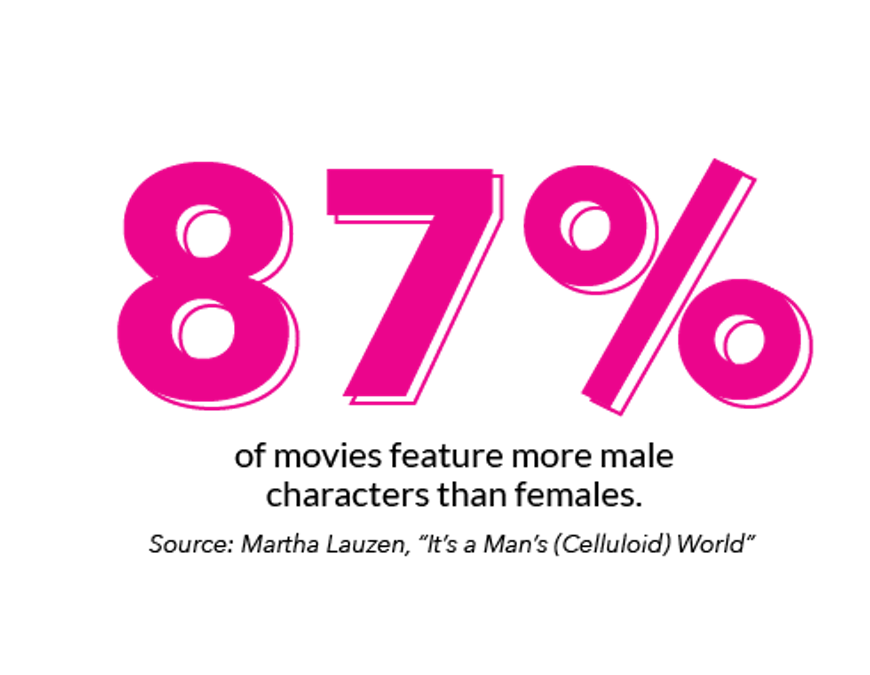There are many ways the general public can review the overall reaction of a movie: Rotten Tomatoes, IMBd, news publications, etc. People have also developed tests that can be applied to movies to measure the level of inclusivity.
One example of these tests is the Bechdel Test. According to the Merriam-Webster dictionary, the Bechdel Test is “a set of criteria used as a test to evaluate a work of fiction (such as a film) on the basis of its inclusion and representation of female characters.”
It was developed by a well-known cartoonist, Alison Bechdel, and has three requirements for a movie to pass. The movie must contain two or more female characters who have a conversation about something other than a man.
According to Martha Lauzen, a researcher of female representation in media, 85 percent of movies feature more male characters than females and only 7 percent have more females than males.
Wes Gehring, a Ball State University professor of film, said the Bechdel Test is important and a start to tackling the problem of female representation in movies. But he also said he thinks the test can be improved.
“I think Bechdel is a goal in the film industry, but it has a long way to go,” Gehring said via email. “The test, however, needs to be tweaked. Films that pass and/or filmmakers that might not pass are still wild cards, such as say the “Kill Bill” movies. One has an auteur that initially one might not include, but here you have a strong woman lead.”
Because of the various factors and subjectivity that go into a film review, the test is not a flawless method for measuring a movie's representation of women. In other words, a movie passing the Bechdel Test doesn’t inherently make it a respectful or fair depiction of women.
The results don’t necessarily determine a film's overall quality but rather allows viewers to make a determination of their interest based on its inclusion of active female characters. So, here are four movies that pass the Bechdel Test and four movies that don’t.

Movies that pass the Bechdel Test:
Barbie
The Barbie movie, starring Margot Robbie, has no problem hitting the first requirement on the Bechdel Test of having two or more female characters. There is also no shortage of women talking to each other about something besides a man in the movie directed by Greta Gerwig.
According to the film critic and journalist Peter Travers, “Her movie rides high on a pink cloud of feminist wish fulfillment in which Barbies come in all shapes, sizes and colors.”
Don’t Worry Darling
The 2022 movie featuring Harry Styles and Florence Pugh takes place in the 1950s and features traditional gender roles. According to Manohla Dargis, the chief film critic for The New York Times, her opinion of the film is that “Its targets are amorphous,” and the portrayal of the “prison-house” of the traditional expectations of women was superficial.
So, while the movie passes the Bechdel Test, Dargis’ review demonstrates the subjectivity of the test results. The exceptions and outside factors that can impact a movie’s representation of women are dependent on an individual’s opinion, which varies.
Frozen
The Disney animated film revolves around two lead female characters who are sisters. Besides the fact that there are only three women in the movie, including their mother, the movie passes the Bechdel Test. The two sisters talk a few times throughout the movie about their lives and relationship to each other.
How to Lose a Guy in 10 Days
While "How to Lose a Guy in 10 Days” falls under the category of romantic comedy and revolves around a man and woman, the movie passes the Bechdel Test. The lead female character, Andie Anderson, is a journalist, and the opening scene of the movie consists of her and a female coworker discussing work, so the movie passes from the get-go.

Movies that don’t pass the Bechdel Test:
Back to the Future
The science-fiction movie “Back to the Future'' came out in the ’80s and has two out of the three criteria for passing. There is more than one female character, and they talk to each other, but their conversation only consists of a discussion about the lead character, Marty McFly.
Ghostbusters (1984)
The movie features four main characters, who are all men, and has few named female characters. Like “Back to the Future," the movie possesses two of the three requirements to pass the Bechdel Test since the two named women don't speak, aside from on the phone about the Ghostbusters.
While the original doesn’t pass, the 2016 adaptation features four female ghostbusters and passes the Bechdel Test with flying colors.
Shrek
The early 2000s animated film has a majority male cast with only one female who has significant dialogue. Cameron Diaz plays Fiona, but the character doesn’t speak to another woman, so the movie featuring the well-known ogre has a one out of three rating for the Bechdel Test.
Star Wars
In the 1977 movie that launched a major franchise, “Star Wars: Episode IV — A New Hope,” the men outnumber the women by a significant amount. The film checks the first requirement, but barely. Only two women in the entire film have speaking parts in scenes with only men, and few women can be found sprinkled into the background.
According to Rebecca Harrison, a lecturer of film at multiple UK universities with a Ph.D. in film studies, only 15 percent of the initial movie of the Star Wars trilogy features a woman on the screen.
While the Bechdel Test can be a good measure of female inclusion in a film on a surface level, there are movies that pass that have questionable depictions of women, and there are films that don’t pass that can still be great movies. So, it can be useful to consider other things, like movie reviews, in addition to the test when choosing what to watch for the next movie night.
Contact Ella Howell with comments at ella.howell@bsu.edu.


![A member of Open Door Health Services [ODHS] Connections Team meets with a resident and assists them with enrolling in a health insurance plan in 2024. CEO and President of ODHS Bryan Ayars said around 10%-11% of their patients they see are uninsured. ODHS, Photo provided](https://snworksceo.imgix.net/bsd/6f04939c-59ef-4f5b-930d-1ab3f45749c1.sized-1000x1000.jpg?w=1000&ar=4%3A3&fit=crop&crop=faces&facepad=3&auto=format)


